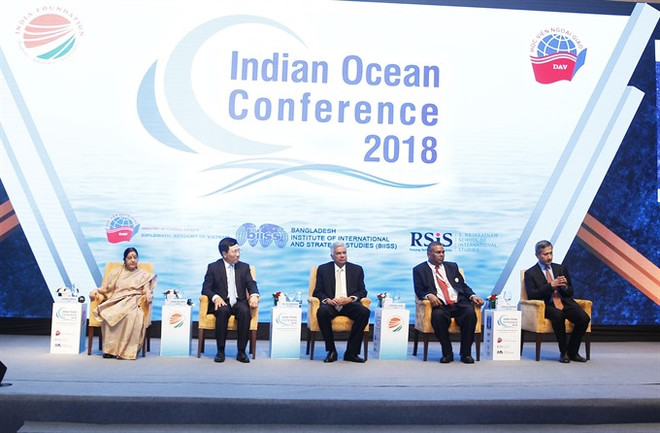Hanoi (VNA) – The third Indian Ocean Conference (IOC) openedin Hanoi on August 27, drawing nearly 300 delegates from 40 countries and territories,including almost 100 Vietnamese officials and scholars.
The two-day event, themed “Building Regional Architecture,” focused on emerging regionalarchitecture and promoting cooperation between stakeholder countries in theregion in building trust, respecting international law and settling disputes ina peaceful manner, as well as maritime management and handling non-traditionalthreats.
In their speeches at the opening session,Vietnamese Deputy Prime Minister and Foreign Minister Pham Binh Minh as well assenior officials from Sri Lanka, India and Singapore shared their viewpoints onthe significance of building an inclusive, rule-based regional architecturewith the central role of ASEAN on the basis of respecting independence,sovereignty and creating favourable conditions for the building of trust.
Indian Minister of External Affairs SushmaSwaraj stressed the Indian Ocean region, with its ancient civilisations anddynamic economies, is at the centre of “the free and inclusive Indo-Pacific.”
She also agreed on the centrality of ASEAN inthe regional maritime structure, in maritime peace, security and freedom ofnavigation, while calling to mind threats that could undermine governance andsecurity in the region, including piracy, smuggling, and naval competition.
Vietnamese Deputy Prime Minister and ForeignMinister Pham Binh Minh stressed the emergence of the Indo-Asian-Pacific as aunified entity.
He said that the conference, aiming atenvisioning viable forms of regional architecture, augurs well for futurecooperation, against the backdrops of growing anti-globalisation, extremism andnationalism.
“The heightened level of exchanges in economic,political and cultural areas is the new driver propelling the Asian century tobecome the Indo-Asian-Pacific century,” Minh said.
He cautioned that constructing anyIndo-Asian-Pacific regional architecture is a “complex undertaking” and that tocontribute to peace, security and prosperity in the region, countries need toembody “four fundamental elements” – inclusivity; respect for internationallaw, freedom of navigation and uninhibited trade flow; ASEAN’s centrality;respect for nations’ sovereignty and independence.
The Vietnamese foreign minister said that forany project within the wide range of co-operation initiatives recently seen –the Regional Comprehensive Economic Partnership (RCEP), India’s Act East,China’s Belt and Road initiative or Japan-US initiative Indo-Pacific – must be“based on the supremacy of international law, respect for self-determination ofthe nation.”
In his remarks, Singaporean Foreign MinisterVivian Balakrishnan emphasised the importance of “maritime advantage” where theseas continue to be the most vital trade route, offering free point-to-pointtravel with little obstruction.
Up to 80 percent of global trade volume and 70percent the total revenues of goods pass are transported by sea, he said, withmost of the routes going through the Indian Ocean, which links prime economiesin the North Atlantic littoral with Asia-Pacific region.
Singapore welcomes regional cooperation, butstressed inter-dependence within ASEAN and how win-win outcomes for all can beachieved even with many world powers competing for dominance, the officialsaid.
“We gain more by working together, investing inone another and by trading with one another, because the opposite scenariois to divide the world into rival blocs, insist on narrow independence, engagein zero sum competition and become puppets of proxy wars,” he said.
Similarly, Sri Lankan Prime Minister Ranil Wickremesingheexpressed his conviction that the Indian Ocean is the ocean of the future,where it will be the world’s maritime super highway, and stressed thatmultilateralism should push for inclusiveness instead of divisiveness.
The conference, which opened in Vietnam afterthe previous two were held in Singapore and Sri Lanka in 2016 and 2017,respectively, is evident of the growing ties between New Delhi and Hanoi andthe position of Vietnam in the US-led Indo-Pacific initiative.-VNA




























